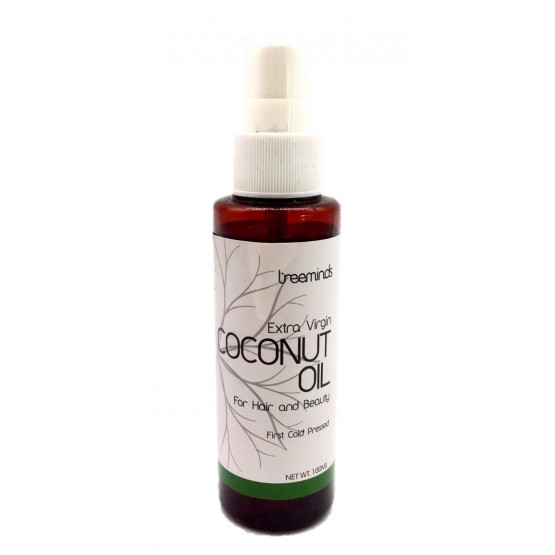NewLife™ Organic Extra Virgin Coconut Oil at its best.
Size : 100ml
It is cold pressed and naturally processed from freshly harvested organic mature coconuts under strict hygienic conditions set by internationally accepted food safety and quality control standards (ISO 22000 and ISO 9000). The oil has such a light, delicate flavour and aroma that you can take it directly by the spoonful.
It is certified organic, certified Halal and Kosher. No chemicals and preservatives are added, so you are guaranteed of a pure unadulterated organic extra virgin coconut oil. Extensive researches have proven that not all saturated fats are harmful.
Coconut oil is made up of beneficial medium-chain fatty acids (MCFAs) that are easily digested and converted into energy. It improves blood cholesterol profile, promotes heart and artery health. The small molecular size of MCFAs facilitates its penetration into the cell membrane without the need for a carrier protein. Upon entry into the body cells, MCFAs are digested instantly and the fat-soluble nutrients can be absorbed rapidly.
You need not worry as the oil would not end up in your belly! Regular intake of Extra Virgin Coconut Oil is able to rev up metabolism, speeding up fat burning, which is good news for those who want to shed of the extra pounds.
Meanwhile, it also contributes to immune boosting and better nutrient absorption. MCFAs have powerful antibacterial, anti-fungal and antiviral properties which are able to relieve infections associated with bacteria, fungus and viruses.
The oil contains natural antioxidant properties of Vitamin E, fatty acids and enzymes. It is rich in medium chain fatty acids which are naturally found in mother’s milk.
Scientific trials revealed amazing health benefits
A randomized controlled trial involving 24 healthy overweight men with body mass indexes between 25 and 31 kg/m2 who consumed diets rich in medium chain fatty acids (MCFAs) and long chain fatty acids (LCFAs) for 28 days showed that those whose diet are rich in MCFAs had a greater loss in upper body adipose tissue compared to those who take LCFAs, due to increased energy expenditure and fat burning associated with MCFAs intake1.
Research have proven that mono-glycerides found in coconut oil, namely, mono-caprin and mono-laurin are most active against helicobacter pylori bacteria after 10 min incubation time at room temperature, suggesting that these fatty acids may affect and disrupt the lipid coated membrane of viruses and plasma membrane of bacteria, which would eventually kill them2.
Lauric acid, a medium chain fatty acid at concentration of 25 μg/mL showed profound anti-Candida activity when tested3.
Comparison between commercial virgin coconut oil in Malaysian and Indonesian markets revealed that the virgin coconut oil evaluated have higher antioxidant activity denoted by their total phenolic content compared to refined, bleached and deodorized (RBD) coconut oil4.
Virgin coconut oil with its high polyphenol content was capable in supporting normal cholesterol level and other blood lipid profiles, which included the increase in HDL cholesterol level5.
Direction
- For internal use
For adults, take 2-4 tablespoons daily
For children, take 1-2 tablespoons daily
NewLife™ Organic Extra Virgin Coconut Oil is ideal for cooking and frying. It can be added into hot drink, dishes and rice.
- For external use
Apply topically on skin for smooth and vibrant looking skin, for skin eczema and psoriasis.
To condition hair, massage oil onto the scalp for 20 minutes and then rinse off.
It can also be used as massage oil
The 21st Century Challenge
Previously, many have shunned away from coconut oil, believing it to be an artery-clogging saturated fat. This misconception capitalised on people’s fear on how bad saturated fats are. Many, even some health professionals, assume that all saturated fats are harmful to the body.
Because of this, coconut oil was replaced with hydrogenated vegetable oils made from soy, corn, sunflower and canola which are perceived as heart-friendly fats.
Unfortunately, as researches continue, scientists finally found out that people who consume partially hydrogenated oil (trans-fat) made of vegetable oils had developed high cholesterol level, and are at greater risk of heart attack than those who did not consume trans-fat.
Due to the overwhelming evidence that linked trans-fat consumption to heart disease risk, coconut oil has now received a resurgence of interest in the recent years.
Who will benefit from NewLife™ Organic Extra Virgin Coconut Oil?
NewLife™ Organic Extra Virgin Coconut Oil is health beneficial and is ideal for the whole family, ranging from young children to the elderly. In particular, it provides the following health beneficial effects:-
- Prevents bacterial, viral and fungal infections
- Promotes healthy thyroid function
- An excellent anti-ageing ingredient
- Stimulates body metabolism
- Increases energy level
- Promotes healthy skin and lustrous hair
- Improves immune system
- Promotes weight loss
References
- St-Onge, M-P., Ross, R., Parsons, W.D. and Jones, P.J.H. 2003. Medium-chain triglycerides increase energy expenditure and decrease adiposity in overweight men. Obesity Research 11: 395-402.
- Bergsson, G., Steingrímsson, O. and Thormar, H. 2002. Bactericidal effects of fatty acids and monoglycerides on Helicobacter pylori. International Journal of Antimicrobial Agents 20: 258-262.
- Huang, C.B., Alimova, Y., Myers, T.M. and Ebersole, J.L. 2011. Short- and medium-chain fatty acids exhibit antimicrobial activity for oral microorganisms. Archives of Oral Biology 56: 650-654.
- Marina, A.M., Che Man, Y.B., Nazimah, S.A.H. and Amin, I. 2009. Chemical properties of virgin coconut oil. Journal of the American Oil Chemists’ Society 86: 301-307.
- Nevin, K.G. and Rajamohan, T. 2004. Beneficial effects of virgin coconut oil on lipid parameters and in vitro LDL oxidation. Clinical Biochemistry 37: 830-835.
Disclaimer: The contents on this page are not to be substituted for medical advice or diagnosis. The information presented here is purely for educational purpose. This is not a prescription for self-diagnosis or self-medication. Consult your own physician regarding the application of any opinions and recommendations with respect to your symptoms or medical conditions

